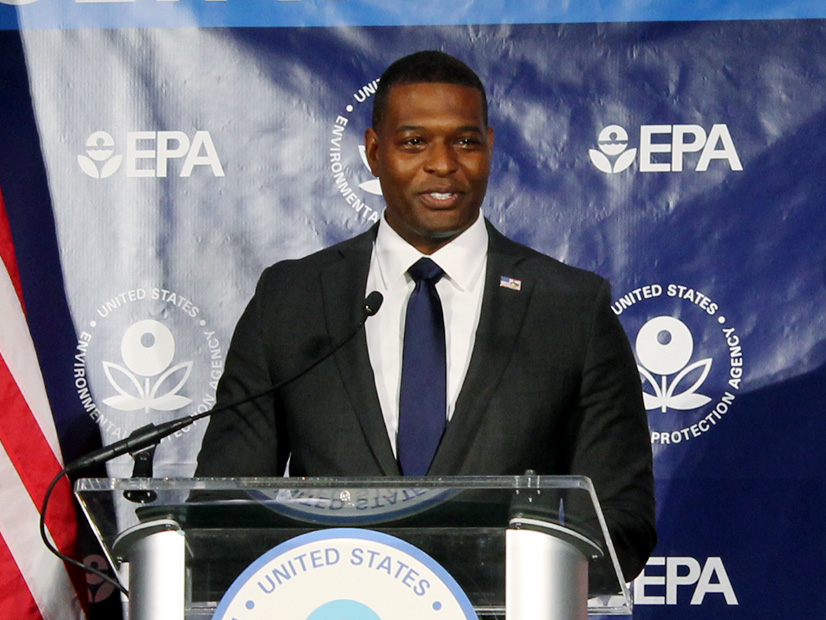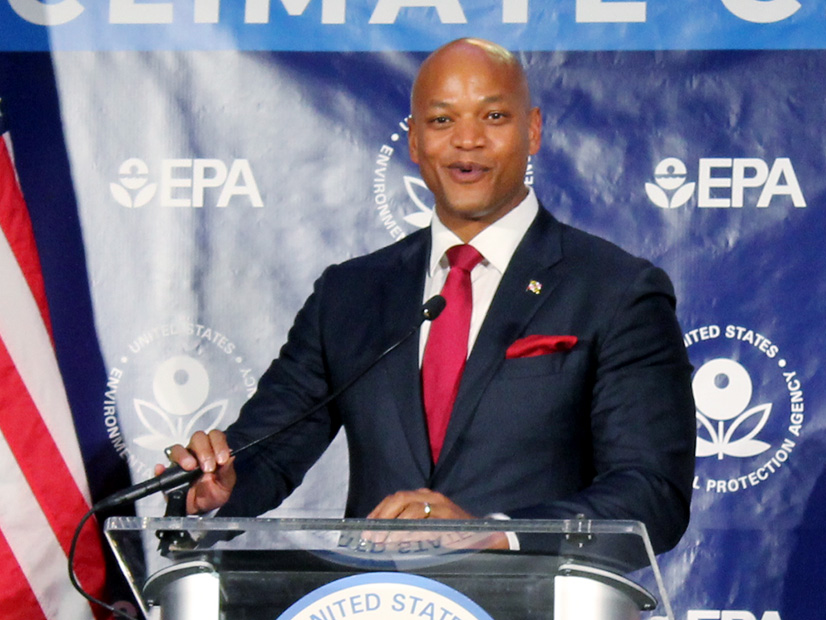
COLLEGE PARK, Md. — EPA Administrator Michael Regan on Thursday said his agency’s newly proposed carbon dioxide emission standards for power plants target “the most egregious sources” of pollution so “we can be sure that we don’t jeopardize the reliability” of the grid.
Regan was speaking to reporters after an event held at the University of Maryland College Park celebrating the official release of the standards earlier that morning. The complex rulemaking would set nationwide standards on CO2-emitting plants based on multiple variables, such as fuel type and frequency of usage. (See related story, EPA Proposes New Emissions Standards for Power Plants.)
They would require most new and existing large-capacity plants to use either carbon capture and sequestration or hydrogen co-firing no later than 2040, with some facilities subject to earlier deadlines based on characteristics. The most stringent standards are reserved for coal plants and new gas plants.
Left out are existing smaller, peaking gas units, defined as less than 300 MW with a capacity factor of less than 50%. For those, EPA is seeking comment on how it “should approach its legal obligation to establish emission guidelines.”
Regan was asked whether he was concerned about the number of gas-fired units left unregulated.
 EPA Administrator Michael Regan answers questions from reporters. | © RTO Insider LLC
EPA Administrator Michael Regan answers questions from reporters. | © RTO Insider LLC
“I think the regulation covers a lot, quite frankly; the most and the largest,” he said. “Some of the smaller sources, some of those peaker plants that run less frequently, we will be thinking about how we tackle those as well. What we want to do with those [plants] is not use a blunt object. We want to be more surgical.”
Regan also emphasized that EPA had been consulting with utility CEOs, grid operators and states over the past two years to give the power sector “the certainty that they’re looking for without compromising reliability or affordability.” The proposal “takes into account all the energy requirements and needs of this country in a way that doesn’t compromise reliability, but the impacts to costs are also extremely negligible. So we believe we’ve threaded a really good needle here.”
Republicans do not agree.
The Biden administration’s “rush-to-green agenda is shutting down American energy and threatening the security and reliability of our electric grid,” Reps. Cathy McMorris Rodgers (R-Wash.) and Bill Johnson (R-Ohio) said in a statement. “We’re currently witnessing an electricity reliability crisis unfolding across the country. … The latest power plant rules being proposed by the EPA will make these problems worse by shutting down reliable energy sources prematurely and adding costly new burdens on sources like natural gas, which is responsible for a significant portion of our emissions reductions.”
Nor does Electric Power Supply Association CEO Todd Snitchler, who said that “once again, aspirational policy is getting ahead of operational reality. If finalized, these aggressive rules will undoubtedly drive up energy costs and lead to a substantial number of power plant retirements when experts have warned that we are already facing a reliability crisis due to accelerated retirements of dispatchable resources.”
But the Edison Electric Institute in a statement echoed some of Regan’s points, saying it valued “that EPA has constructively engaged with EEI and our member companies over the past 18 months, and we look forward to continuing to work with Administrator Regan and his team throughout the rulemaking process.”
The organization said it had lobbied for aligning the standards’ compliance deadlines with utilities’ existing transition plans and recognizing “the critical role existing and new natural gas generation plays — and will continue to play — in integrating more renewable energy and maintaining reliability.” It had also urged “a range of compliance flexibilities,” including hydrogen co-firing.
Legal Scrutiny
Environmental groups were nearly uniformly positive about the proposal, saying it would help the U.S. meet its emission-reduction goals.
“I think all of our stakeholders understand just how strong and how strategic this rule is. We’re also all living in a post-West Virginia [v. EPA] time,” Regan said, referring to the Supreme Court decision last year that struck down the Obama-era Clean Power Plan.
EEI noted in its statement that, “for the third time in nine years, EPA is proposing to limit carbon emissions from power plants using Clean Air Act Section 111.”
The group was referring to the CPP and the Trump administration’s Affordable Clean Energy rule, the latter of which would be repealed by the new rules.
“Last year, the Supreme Court threw out the Environmental Protection Agency’s overreaching mandates on power plant emissions,” said Sen. John Barrasso (R-Wyo.), ranking member of the Senate Energy and Natural Resources Committee. “The court rightfully confirmed Congress, not the EPA, has the authority to create environmental policy. Nothing has changed since then to give the unelected and unaccountable bureaucrats at the EPA this authority.”
 Maryland Gov. Wes Moore celebrated the new standards and applauded the Biden administration’s work to address climate change. | © RTO Insider LLC
Maryland Gov. Wes Moore celebrated the new standards and applauded the Biden administration’s work to address climate change. | © RTO Insider LLC
The court threw out the CPP, however, because it found that EPA lacks authority to compel generation shifting, ruling that it was a “set of state cap-and-trade schemes.” The agency is limited to requiring steps that individual plants can make “inside the fence line,” the court said. (See Supreme Court Rejects EPA Generation Shifting.)
But Sen. Joe Manchin (D-W.Va.), chair of the Senate Energy and Natural Resources Committee, announced on Wednesday that he would oppose every nominee to EPA before the committee because he said the agency did not even have the authority to regulate power plants’ emissions.
“Neither the [Infrastructure Investment and Jobs Act] nor the IRA gave new authority to regulate power plant emission standards,” Manchin said. “However, I fear that this administration’s commitment to their extreme ideology overshadows their responsibility to ensure long-lasting energy and economic security.”
Regan on Thursday reiterated that he was confident that the Biden administration’s version would be upheld. Asked how the failure of the CPP influenced the new rules, he said the proposal “is a completely separate rule from the Clean Power Plan.”
“This rule is well within the bounds of our statutory authority and the West Virginia Supreme Court decision,” he said. “We feel really good that we’re using the Clean Air Act’s traditional authority. We’re looking at the backdrop of the Inflation Reduction Act and those incentives for advanced technologies to put out a very strong rule that is really aggressive as it relates to combating the climate crisis. [I’m] very proud and very comfortable and confident that this is a very strong, legally sound, durable rule.”



